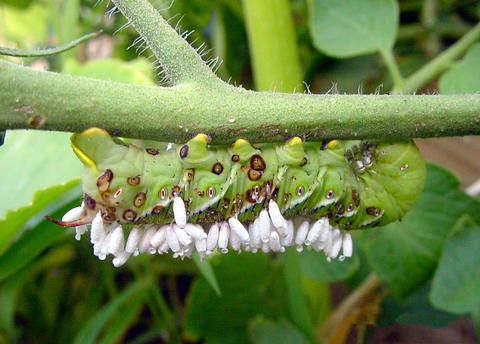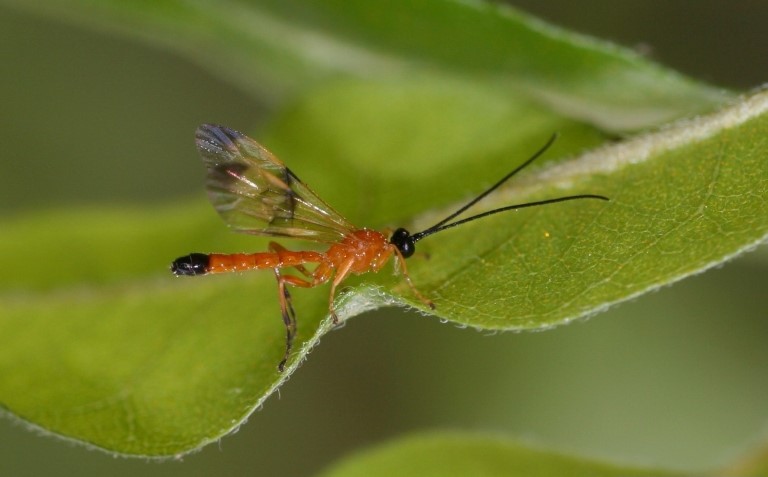Parasitic wasps are wasps that lay their eggs inside other insects. This sounds brutal — and it is for the other insects — and when some homeowners hear about parasitic wasps, they wonder if parasitic wasps are dangerous to humans. Wasps get a bad reputation anyway — because of the likes of hornets and yellow jackets — so knowing about parasitic wasps doesn’t help that reputation. But are parasitic wasps dangerous to humans?
Parasitic wasps fast facts
- Parasitic wasps are not the same as the pesky “wasps” you normally think about. When you think about wasps, the first image that comes into your mind is probably a big and yellow flying insect. Parasitic wasps don’t look like hornets and yellow jackets. They are only a few millimeters small. You will often find them feeding on flowers or flying around looking for a place to nest. You will also often see them in their pupa stage, where they look like caterpillars with small white grains on them.
- They are actually beneficial insects. The parasitic wasp life cycle involves parasitic wasps laying their eggs on others. The targets die as the born parasitic wasps emerge. Here’s the best part — most of their targets are garden pests, such as aphids and cabbage worms. This means that parasitic wasps are actually beneficial to have in your garden. They are natural pest controllers that don’t really sting humans. However, take note that there are instances where they can sting, especially if you mishandle them or pose a threat to them. Otherwise, they are really not that interested in humans.
- There are many species of parasitic wasps out there. Different parasitic wasps target different garden pests. The most common among them are Trichogramma wasps. These beneficial insects are effective against various worms like tomato hornworms. They are also commercially available. Other common parasitic wasps include alphelinids, chalcidids, encyrtids, and ichneumons.

How to attract parasitic wasps
- Limit the use of pesticides in your garden. Pesticides are effective in getting rid of garden pests. But here’s the thing — they are also effective in getting rid of everything else. They have toxic ingredients, so of course, they kill everything in their wake. This may prevent beneficial insects like parasitic wasps from thriving in your garden. It’s okay to have a few insects here and there in your garden. They can preserve biodiversity and prevent pest infestations. Avoid bombing your garden with pesticides too frequently to the point where insects can no longer thrive.
- Provide an abundant supply of pollen and nectar. Parasitic wasps feed on flowers. They particularly like pollen and nectar. If you have flowers in your garden, you will naturally attract these beneficial insects. Some flowers to consider are those from the carrot family, such as corianders, cilantro, and fennels. You can also consider those from the aster family, like goldenrods and sunflowers. You won’t have problems even if your garden is more of a vegetable one. You can always interplant flowers or introduce flower beds to your vegetable garden.
- Buy parasitic wasps yourself. If naturally attracting parasitic wasps sounds complicated to you, you can always just buy them yourself. They are commercially available. In fact, parasitic wasps are so accessible that even just one Google search will direct you to retailers. There are companies out there that specialize in gardening and organic products. Just make sure that their offerings are actually approved for organic use.
How to use parasitic wasps to get rid of garden pests
- Naturally attract parasitic wasps and let them do the hard work. Once you attract parasitic wasps by limiting the use of pesticides and providing them with accessible food and water, you really don’t have to do anything. They will do the hard work for you and get rid of your garden pests. But what about the parasitic wasps when the garden pests are already gone? Well, they won’t really cause problems like your typical garden pests. They don’t really need to be pest controlled. Also, their lifespans are relatively short — just 40 days. But if you really want to get rid of them yourself, you can just use pesticides.
- Buy parasitic wasps and release them to your garden. Parasitic wasps are effective biological controllers. In fact, they are some of the most commonly used biological controllers by gardeners. But there’s a catch — you actually have to buy the right kind of parasitic wasp for the garden pest you have. You can’t just buy a random community of parasitic wasps and expect it to kill off your garden pests. Identify the garden pests you have first before you shop around for parasitic wasps.
- Just sit back and relax. You don’t really have to do anything while parasitic wasps are thriving in your garden and killing off garden pests. You probably won’t even see them because of their small size. And you will just feel the effects of their efforts. This is particularly true if you are naturally attracting parasitic wasps. Your garden may end up attracting other beneficial insects. Buying parasitic wasps can be more complicated because you may have to buy them multiple times to let them scale. They die off pretty easily after all.

Parasitic wasps are not dangerous to humans
No, parasitic wasps are not dangerous to humans. They don’t normally sting. And if they do, it’s probably because of mishandling or you are becoming a threat to them. Generally, they don’t care about humans, so they will leave us alone.
Parasitic wasps are actually beneficial insects, especially if you have a garden. If you let them thrive in your garden, they can help get rid of garden pests naturally. It’s common practice for gardeners to naturally attract parasitic wasps to help control garden pests like worms. And you can do the same thing even if you are not a professional gardener.
If all else fails, you can always just buy parasitic wasps from retail stores, but you may have to buy multiple times to make it worth the effort because they too die off very easily.

